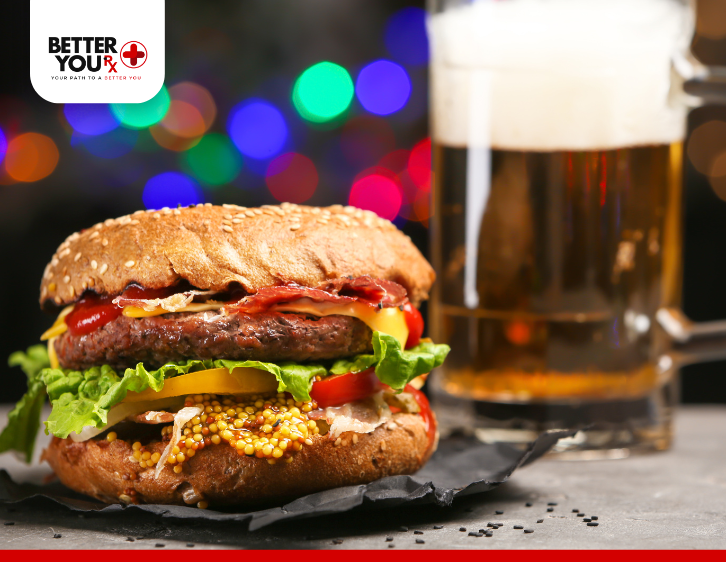Ozempic (semaglutide) has gained prominence as a medication for managing type 2 diabetes and aiding weight loss. While effective in regulating blood sugar levels, individuals on Ozempic must also be mindful of their dietary choices to maximize the medication’s benefits and minimize potential side effects. This article discusses the foods to avoid while taking Ozempic, emphasizing dietary choices that enhance overall health and well-being.
Understanding Ozempic and Its Mechanism
Ozempic works by mimicking the action of the GLP-1 hormone, which helps lower blood sugar levels by stimulating insulin production and slowing gastric emptying. This mechanism leads to reduced appetite, aiding in weight management. However, certain foods can counteract these effects, potentially leading to increased side effects or decreased efficacy of the medication.
Foods to Avoid While Taking Ozempic
When considering what foods to avoid while taking Ozempic, it’s crucial to identify those that can worsen side effects, complicate blood sugar management, or promote weight gain. Here are some key categories to consider:

High-Fat Foods
Foods rich in unhealthy fats can increase the likelihood of gastrointestinal side effects, such as nausea and bloating. Examples include:
- Fried Foods: These often contain trans fats that can be difficult to digest and may exacerbate nausea.
- Fatty Cuts of Meat: High in saturated fats, these can worsen bloating and discomfort.
- Full-Fat Dairy Products: Milk, cheese, and cream can contribute to gastrointestinal issues for some individuals.
Sugary Foods and Drinks
Consuming high amounts of sugar can lead to rapid spikes in blood sugar levels, which Ozempic is designed to control. It’s best to avoid:
- Sugary Snacks and Desserts: Items like cookies, cakes, and candies can lead to unhealthy spikes in blood glucose.
- Sugary Beverages: Sodas and sweetened coffee drinks are particularly detrimental.
- Fruit Juices with Added Sugars: Even natural juices can be problematic if they contain additional sweeteners.
Processed and Fast Foods

These often contain unhealthy fats, sugars, and preservatives that can hinder weight loss efforts and overall health. Limit your intake of:
- Fast Food Items: Burgers and fries often contain high levels of unhealthy fats and sugars.
- Packaged Snacks: Chips and crackers are usually high in calories and low in nutritional value.
- Frozen Meals: Many of these meals are loaded with sodium and unhealthy fats.
Alcohol
While moderate alcohol consumption may be acceptable for some individuals, it’s essential to be cautious. Alcohol can interfere with blood sugar control and exacerbate side effects of Ozempic, such as dizziness or gastrointestinal discomfort. Consider limiting or avoiding:
- Beer, Wine, and Spirits: These can contribute to fluctuations in blood sugar.
- Sweetened Cocktails: Often high in sugar and calories, making them a poor choice.
High-Carbohydrate Foods
Foods high in carbohydrates can lead to spikes in blood sugar. It’s advisable to minimize:
- White Bread and Pasta: Refined grains can cause rapid glucose surges.
- White Rice: This is high in carbohydrates and low in fiber.
- Sugary Cereals: Many breakfast cereals are loaded with sugars.
Managing Side Effects Through Diet

Understanding how to minimize side effects of Ozempic through diet is crucial for those starting on this medication. Common side effects include nausea, vomiting, and diarrhea. To alleviate these symptoms, focus on:
- Smaller, More Frequent Meals: Eating smaller portions can help reduce nausea. Consider consuming five to six smaller meals throughout the day rather than three large meals.
- Bland Foods: Foods such as crackers, rice, and bananas can be easier on the stomach during episodes of nausea.
- Staying Hydrated: Drinking plenty of water can help with digestive issues and overall well-being.
Recommended Foods While on Ozempic
In contrast to the foods to avoid, it’s also essential to focus on those that can help manage diabetes and promote weight loss. Some recommended food options include:
- Lean Proteins: Chicken, turkey, fish, tofu, and legumes provide essential nutrients without excess fat.
- Whole Grains: Brown rice, quinoa, and whole-grain bread can help regulate blood sugar levels.
- Fruits and Vegetables: Non-starchy vegetables and low-glycemic fruits (such as berries and cherries) are excellent choices.
- Healthy Fats: Sources like avocados, nuts, and olive oil can support overall health when consumed in moderation.
The Importance of Monitoring Your Diet
Maintaining a balanced diet while on Ozempic is essential for achieving the desired results in blood sugar control and weight management. Regular consultations with healthcare providers or registered dietitians can help you create a tailored meal plan that suits your individual health needs.
Conclusion
In conclusion, being mindful of the foods you consume while on Ozempic is crucial for maximizing the medication’s effectiveness and minimizing side effects. Avoiding high-fat, sugary, and processed foods can significantly enhance your experience with Ozempic, making it a valuable tool in your health management arsenal.
If you’re looking for affordable Ozempic, consider exploring options through Better You Rx, an online Canadian Pharmacy Affiliate referral service. They provide access to cheap drugs and meds from Canada, ensuring you can find cheap medicines and cheap drugs online without compromising quality. Prioritizing a healthy diet alongside your Ozempic treatment can lead to better management of your health and overall well-being.



